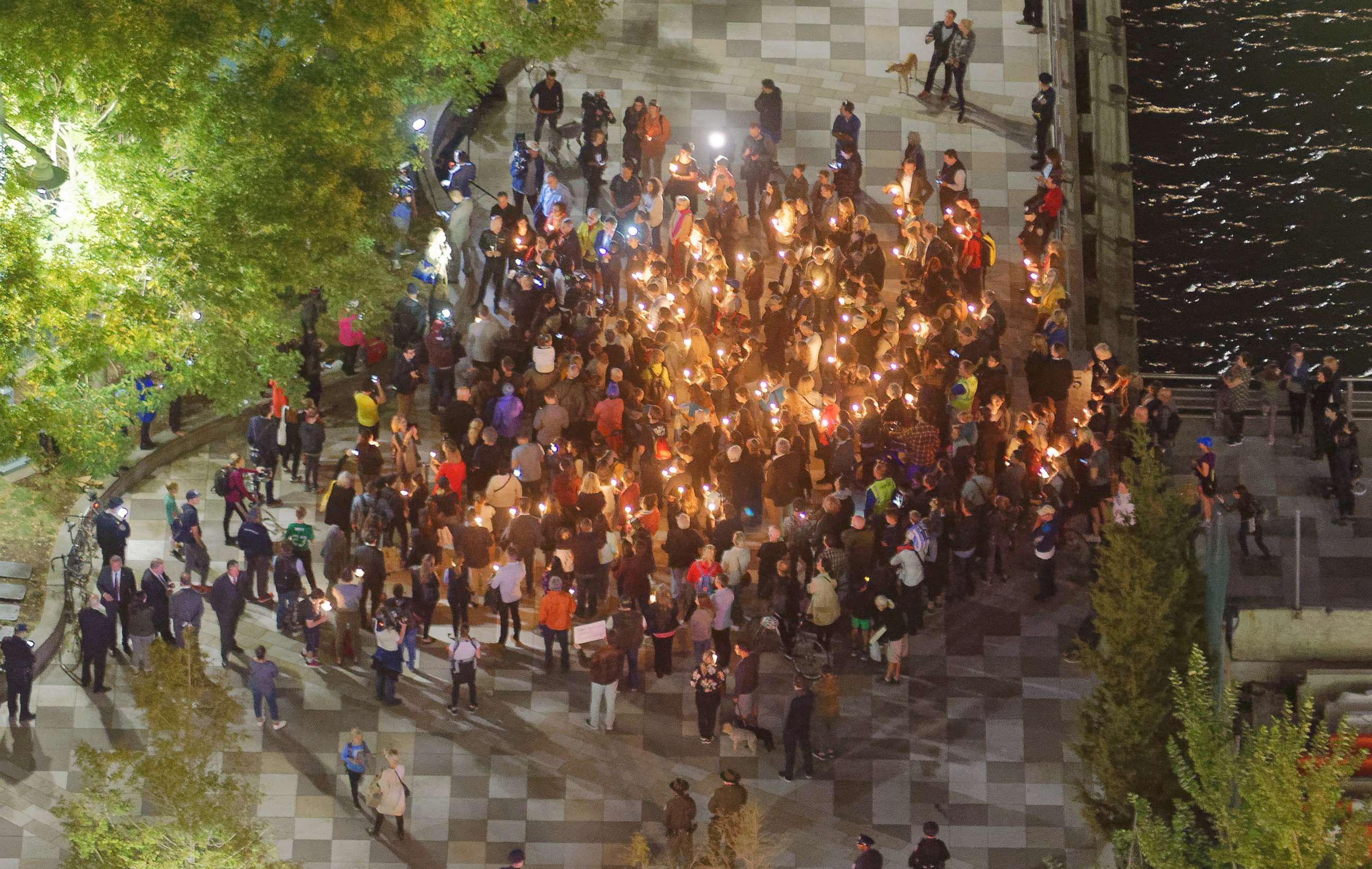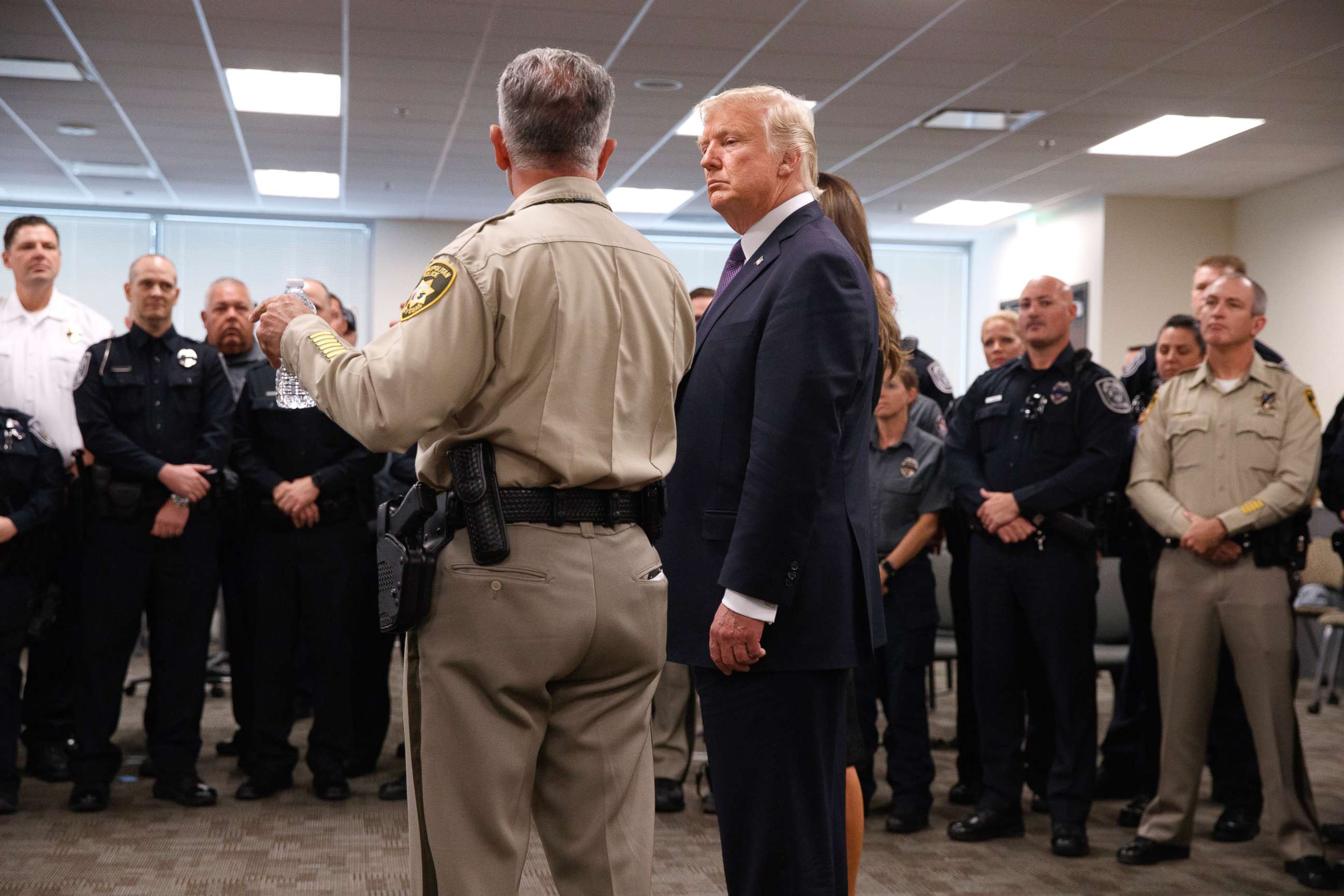Texas church shooting: How Trump's reactions to mass attacks differ for US-born suspects like Devin Kelley
Deadliest shootings have mostly been carried out by people born in the U.S.
— -- The mass shooting on Sunday at a church in rural Sutherland Springs, Texas, is the latest instance in which President Donald Trump did not call for immediate policy changes when the suspect in a large-scale attack has no apparent ties to other countries or foreign terrorist groups.
Trump has condemned the American-born church shooting suspect but blamed a "mental health problem at the highest level," without demanding government action.
That contrasts with his response to mass attacks like the deadly truck ramming in New York City just five days before the Texas shooting. After the truck attack on a bike path, he almost immediately reiterated his frequent demands for an overhaul of the immigration system and also called for the end of a specific visa lottery program.
It fits a pattern, according to one expert.
"The policies of this administration focus much more attention on mass casualty attacks in which the perpetrator can be connected in some way to a foreign terrorist organization and therefore validate the administration's rhetoric on the need for a travel ban and stronger immigration enforcement," said John Cohen, an ABC News consultant and a former counterterrorism coordinator for the Department of Homeland Security.
Such a focus is "ironic," Cohen added, because "many more casualties caused over the last several years in particular were through attacks by individuals who were born and raised in this country."
The statistics bear that out: Four of the five deadliest mass shootings in modern U.S. history involved American-born perpetrators, though one was the son of an Afghan immigrant. Seven of the 10 deadliest mass shootings were committed by white Americans.
But White House press secretary Sarah Sanders denied a day after the Manhattan truck ramming that Trump was trying to make political hay out of the attack. "The president has been talking about extreme vetting [of some immigrants] and the need for that for the purpose of protecting the citizens of this country since he was a candidate," she said at a press briefing.
Sanders added, "This isn't a new argument. This isn't a new position."
'Deranged' people
Trump has used a number of terms to describe different kinds of assailants.
In his Oct. 2 comments after the Las Vegas concert shooting, he referred to U.S.-born shooter Stephen Paddock simply as "a gunman" but in a tweet two days later called him "the demented shooter."
After the Oct. 31 truck ramming in New York City, Trump tweeted that the driver, Uzbek immigrant Sayfullo Saipov, was "a very sick and deranged person." In another tweet, Trump wrote, "ISIS just claimed the Degenerate Animal who killed, and so badly wounded, the wonderful people on the West Side."

Trump was in Japan on Sunday when news broke of the church shooting in Sutherland Springs, and in his first public reaction he called suspect Devin Kelley "a very deranged individual."
Some of his harshest comments were reserved for Omar Mateen, the shooter at Pulse nightclub in Orlando, Florida, in 2016. Then-candidate Trump said Mateen, the U.S.-born son of an Afghan immigrant, "slaughtered clubgoers" and in another tweet shared a link to a story connecting "this savage from Orlando" to Trump's discredited claims that people were cheering after the 9/11 attacks.
Pointing to policy but only in some cases
In recent cases that involve perpetrators with foreign ties — including the 2015 San Bernardino, California, shooting; the Pulse nightclub shooting; and the truck attack in New York City — Trump has pivoted toward policy change suggestions within days or sometimes hours of the episode.
He drew a clear connection between certain shootings and the need for his then-proposed policies in one of his responses immediately after the Pulse nightclub shooting, in which Mateen killed 49 people.
"What has happened in Orlando is just the beginning. Our leadership is weak and ineffective. I called it and asked for the ban. Must be tough," Trump wrote in a tweet less than 14 hours after the first shots were fired.
During his speech to the National Rifle Association in April 2017, when he became the first sitting president since Ronald Reagan to speak to the lobbying group, Trump singled out three mass casualty attacks that involved individuals he has referred to as radical Islamic terrorists.
"We've seen the attacks, from 9/11 to Boston to San Bernardino. Hundreds of individuals from other countries have been charged with terrorism-related offenses in the United States," he said in the speech.
He did not mention any mass shootings that occurred on U.S. soil, many of which were committed by people born in America.

Demographic breakdown
Four of the five deadliest shootings in modern U.S. history were committed by men born in the United States: Stephen Paddock, who committed the Las Vegas shooting last month; Mateen, who was responsible for the Pulse nightclub shooting in Orlando; Adam Lanza, who opened fire at the Sandy Hook Elementary School in Newtown, Connecticut in 2012; and now Kelley in Texas.
In the fifth case, Seung-hui Cho, who was responsible for the 2007 Virginia Tech shooting, was born in South Korea but was a permanent U.S. resident at the time of the shooting.
In the 10 deadliest mass shootings in modern U.S. history, seven of the killers were white men, and three of the perpetrators were nonwhite.
Cohen, who has spent three years studying mass casualty attacks in the United States and Europe at Rutgers University in New Jersey, said the research is "finding a lot of behavioral and psychological characteristics that are common across this group of people, whether they're motivated by ideological objectives or something else."
"There is no religious, ethnic or socioeconomic profile — even among those motivated by extremist ideologies such as those of terrorist groups like ISIS," he said. "Regardless of motive, many of these offenders present common behavioral, psychological and life experience characteristics."
Cohen listed a number of such characteristics, including several that could apply to Kelley, such as a history of violent behavior, criminal activity and work and other life failures. It's unclear whether others — such as underlying mental or behavioral health issues, feelings of exclusion and perceived victimization — might apply in the latest mass shooting.




